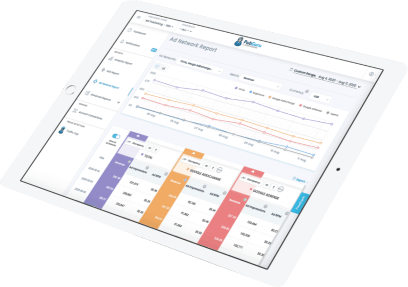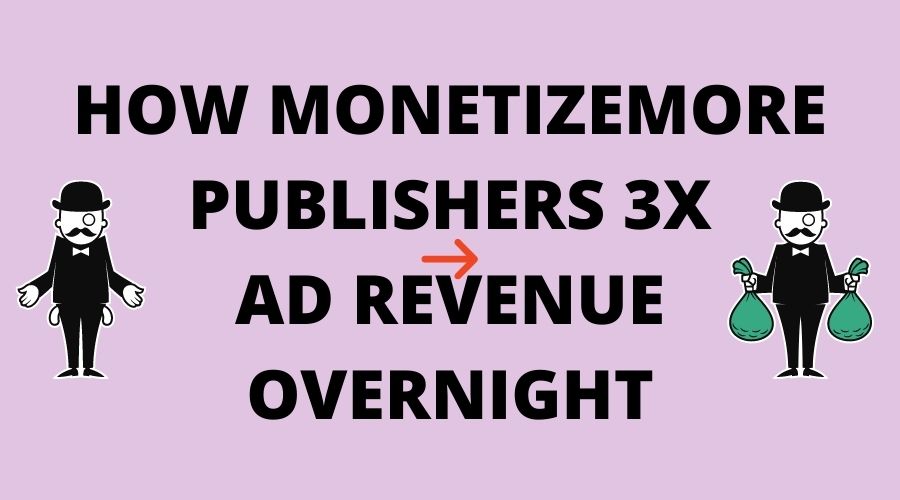This post was most recently updated on February 27th, 2024
As a finance site, you want to maximize your ad revenue while keeping your audience engaged and satisfied. To achieve this, you need to focus on a few key areas: understanding your audience, choosing the right ad networks, optimizing ad placements and formats, leveraging affiliate marketing, and implementing sponsored content. In this article, we’ll explore each of these areas in detail and provide you with some monetization tricks to help boost your revenue.
Understanding the finance site audience
The first step to making the most ad revenue as a finance site is to understand your audience. Finance is a broad topic, and you need to identify your target audience and cater to their preferences and needs. Are you targeting investors, traders, or personal finance enthusiasts? What are their demographics, interests, and pain points? Once you know your audience, you can create content that resonates with them, and attracts more traffic to your site.
Finance Niche RPM/CPM Averages (Based on MonetizeMore’s historical data)
| Country | RPM (USD) | CPM (USD) |
|---|---|---|
| Canada | $25 – $35 | $3 – $5 |
| United States | $30 – $45 | $3 – $5 |
| Germany | $20 – $30 | $3 – $4.5 |
| United Kingdom | $22 – $33 | $3 – $4.5 |
| Australia | $18 – $28 | $2.5 – $4 |
Let’s break down RPMs for the sub-niches of “Personal Finance” and “B2B Financial Services”, comparing and contrasting them with examples:
How They’re Similar
- High-Value Keywords: Both sub-niches involve terms like “investing,” “insurance,” and “credit” that advertisers are willing to pay well for. This is the foundation for strong RPM potential.
- Potential for Affiliate Programs: Products and services in these sub-niches have lucrative affiliate promotions, which can significantly boost revenue beyond just display ads.
- Audience Intent Matters: Users engaging with content in either sub-niche often have greater commercial intent than, say, general entertainment seekers. This makes them more valuable ad targets.
Key Differences
Audience Size and Specificity:
- Personal Finance: Broader audience, ranging from beginners seeking budgeting tips to experienced investors.
- B2B Financial Services: Smaller, niche audience of business professionals. Ads can be hyper-targeted to their needs.
CPM vs. CPA:
- Personal Finance: Likely a mix of CPM (cost-per-thousand-impressions) and CPA (cost-per-action such as an email signup) advertising.
- B2B Financial Services: CPA models become more common. Advertisers often pay handsomely for qualified leads (e.g., businesses scheduling a software demo).
RPM Potential:
- Personal Finance: Decent to good, depending on how targeted the content is.
- B2B Financial Services: Potential for VERY high RPMs due to the value of leads, but it hinges on attracting the right audience.
Examples
Personal Finance Site:
- Topic: “Best Credit Cards for Travel Rewards”
- Ad Types: Display ads from banks, and CPM affiliate links to card comparison sites.
- RPM: $10-$20 depending on traffic quality
B2B Financial Services Site:
- Topic: “SaaS Accounting Solutions for Startups”
- Ad Types: Lead generation forms for accounting software, likely CPA, not display.
- RPM: Potentially $50+, but depends heavily on the quality of leads generated.
Catering to audience preferences and needs
Once you know your audience, you need to cater to their preferences and needs. This means creating content that is relevant, informative, and engaging. You can use various formats, such as articles, videos, infographics, and podcasts to present your content. You can also use different tones, such as educational, entertaining, or inspirational to match your audience’s interests.
For example, if your target audience is personal finance enthusiasts, you may want to create content that provides practical tips on budgeting, saving, and investing. You can also use a friendly and approachable tone to make the content more relatable and less intimidating.
Furthermore, you can also consider the format and design of your website. Is it easy to navigate? Is the layout visually appealing? Does it load quickly? These factors can impact the user experience and ultimately affect how long visitors stay on your site.
In conclusion, understanding your audience is crucial to the success of your finance site. By identifying your target audience and catering to their preferences and needs, you can create content that resonates with them and drives more traffic to your site. Additionally, by considering the user experience and design of your website, you can ensure that visitors have a positive experience and are more likely to return in the future.
Choosing the right ad networks

Once you have a solid understanding of your target audience, you need to choose the right ad networks to display your ads. Ad networks are third-party platforms that connect advertisers with publishers, and offer various ad formats and targeting options. You want to select ad networks that offer high-quality ads, competitive payouts, and relevant ad targeting options.
When selecting ad networks, it’s important to consider the type of content on your website. For example, if your finance site focuses on investing, you may want to choose ad networks that specialize in financial products and services. This will ensure that the ads displayed on your site are relevant to your audience and are more likely to generate clicks and conversions.
Top ad networks for finance sites

There are several ad networks that are popular among finance sites. These include MonetizeMore, Google AdSense, and PropellerAds. Each of these networks offers different ad formats such as display ads, native ads, and video ads, and targeting options, such as contextual, behavioral, and geo-targeting. You should evaluate each network’s performance and choose the ones that generate the highest revenue and provide the best user experience for your audience.
Google AdSense is a popular choice for finance sites because it offers a wide range of ad formats and targeting options. MonetizeMore is another popular choice, as it specializes in contextual advertising and offers high-quality ads that blend seamlessly into your site’s content. PropellerAds is known for its high payouts and global reach, but MonetizeMore is popular among larger finance sites due to its premium ad placements and personalized support.
Evaluating ad network performance
You can evaluate ad network performance by monitoring key metrics such as CPM (cost per thousand impressions), CPC (cost per click), CTR (click-through rate), and RPM (revenue per thousand impressions). It’s important to track these metrics over time to identify trends and make informed decisions about your ad strategy.
Another way to evaluate ad network performance is through A/B testing. This involves experimenting with different ad placements, formats, and networks and measuring their impact on your revenue and user engagement. By analyzing these metrics, you can optimize your ad strategy and increase your ad revenue.
In addition to tracking metrics and conducting A/B tests, it’s important to review your ad network partners regularly. Make sure they are still meeting your needs and providing high-quality ads. If you notice a decline in performance, consider switching to a different ad network or adjusting your ad strategy.
Optimizing ad placements and formats
Optimizing ad placements and formats is crucial for maximizing your ad revenue and avoiding user frustration. However, it’s not just about slapping ads everywhere on your website. You want to balance user experience and ad revenue by placing your ads in strategic locations, and using the most effective ad formats for your audience.
One of the most important factors to consider when optimizing ad placements is the user behavior on your website. For instance, if your users tend to scroll down quickly, above the fold ads may be more effective for you. On the other hand, if your users tend to read through your content thoroughly, in-content ads may be a better option for you.
Best ad placements for finance sites

The best ad placements for finance sites depend on your site design, user behavior, and content structure. However, some common ad placements that work well for finance sites include above the fold, in-content, and sidebar ads.
Above the fold ads are placed at the top of the page, and are visible without scrolling. This placement is effective for catching the user’s attention as soon as they land on your website. In-content ads are placed within the body of the content, and are less intrusive. This placement is effective for keeping the user engaged with your content while also displaying relevant ads. Sidebar ads are placed on the right or left side of the page, and are visible throughout the browsing experience. This placement is effective for displaying ads that are always visible to the user, even when they’re scrolling through your content.
Selecting the most effective ad formats
The most effective ad formats for finance sites depend on your audience’s preferences and the type of content you offer. Some popular ad formats include display ads, native ads, and video ads.
Display ads are visual ads that are placed on various parts of the page, and can be either static or animated. They are effective for catching the user’s attention and promoting a product or service. Native ads are ads that match the look and feel of the site, and are less intrusive. They are effective for blending in with your content and providing a seamless user experience. Video ads are ads that play before, during, or after video content, and are becoming increasingly popular for finance sites. They are effective for engaging the user and promoting a product or service through a more immersive experience.
Balancing user experience and ad revenue
It’s important to balance user experience and ad revenue by avoiding excessive ads, pop-ups, or autoplay videos that interrupt the user’s browsing experience. You want to ensure that your ads are relevant, targeted and engaging, and that they complement your content rather than distract from it.
By optimizing your ad placements and formats, you can increase your ad revenue without sacrificing user satisfaction. Remember to test different placements and formats, and analyze your results to see what works best for your website.
Leveraging affiliate marketing
Affiliate marketing is another effective way to monetize your finance site. Affiliate marketing involves promoting other people’s products or services and earning a commission for each sale or lead generated through your referral link. This can be a win-win situation for both you and your audience, as you can recommend valuable products and services that align with your niche and help your audience solve their problems.
Identifying relevant affiliate programs
To identify relevant affiliate programs, you need to research and evaluate different programs and products in your niche. You can use affiliate networks such as ShareASale, Commission Junction, and Rakuten Marketing to find affiliate programs that match your audience’s interests and pain points. You should also consider the commission rates, cookie duration, and conversion rates of each program, and choose the ones that provide the highest value for your audience and generate the most revenue for you.
Promoting affiliate products effectively
To promote affiliate products effectively, you need to create content that educates and convinces your audience to purchase the product or service. This can be achieved through product reviews, tutorials, case studies, or comparisons. You should also disclose your affiliate links and be transparent about your relationship with the product or service. By providing value and building trust with your audience, you can increase your affiliate revenue and strengthen your brand reputation.
Implementing sponsored content
Sponsored content is a form of advertising that involves creating content that promotes a brand or product. This can be a lucrative way to monetize your finance site, as long as you choose sponsors that align with your audience’s interests and provide value.
Finding the right sponsors
To find the right sponsors, you need to research and evaluate different brands and products in your niche. You should consider their target audience, values, reputation, and relevance to your niche. You should also negotiate the terms and compensation of the sponsorship, and ensure that you have the creative control and editorial rights over the sponsored content.
Creating valuable sponsored content
To create valuable sponsored content, you need to balance the sponsor’s message with your audience’s interests. This means creating content that educates, entertains, or inspires your audience, while showcasing the sponsor’s brand or product in a subtle and sophisticated way. You should also disclose the sponsored nature of the content, and avoid misleading or spammy practices that could discredit your site’s credibility and authority.
Conclusion
Making the most ad revenue as a finance site requires a combination of understanding your audience, choosing the right ad networks, optimizing ad placements and formats, leveraging affiliate marketing, and implementing sponsored content. By following the tips and tricks outlined in this article, you can increase your ad revenue and provide value to your audience at the same time. Remember, the key to success is balancing user experience and monetization and constantly testing and improving your ad strategy based on your audience’s feedback and behavior. Good luck!
Related Reads
HOW MUCH SHOULD MY WEBSITE BE EARNING ?
GOOGLE ADSENSE PAYMENT METHODS – WHICH IS THE SAFEST?
MONETIZEMORE ASSURES PUBLISHER PAYMENTS [HERE’S HOW]
source https://www.monetizemore.com/blog/how-finance-sites-can-make-more-money/



0 Comments